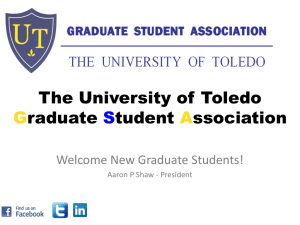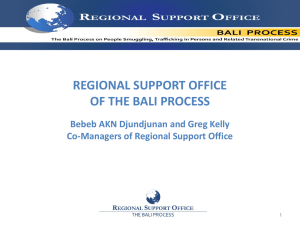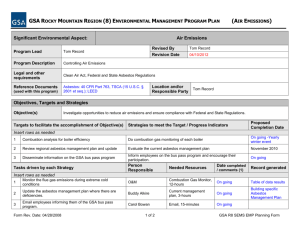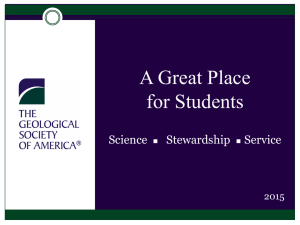Updated May 6, 2014 GRADUATE FINANCIAL ALLOCATION
advertisement
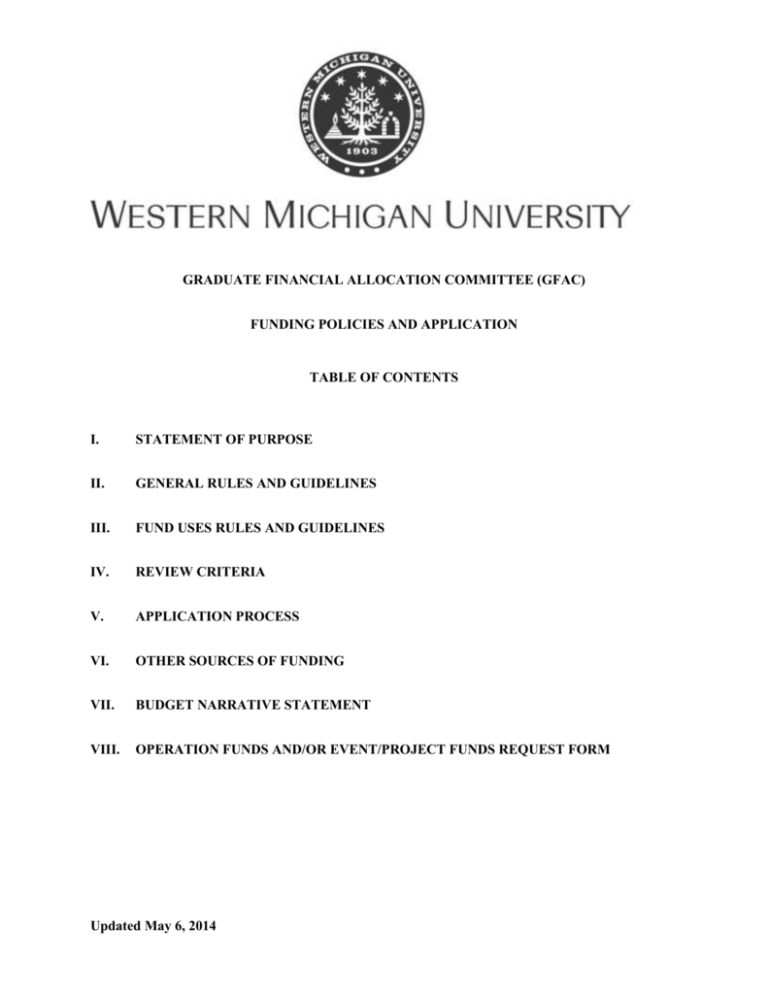
GRADUATE FINANCIAL ALLOCATION COMMITTEE (GFAC) FUNDING POLICIES AND APPLICATION TABLE OF CONTENTS I. STATEMENT OF PURPOSE II. GENERAL RULES AND GUIDELINES III. FUND USES RULES AND GUIDELINES IV. REVIEW CRITERIA V. APPLICATION PROCESS VI. OTHER SOURCES OF FUNDING VII. BUDGET NARRATIVE STATEMENT VIII. OPERATION FUNDS AND/OR EVENT/PROJECT FUNDS REQUEST FORM Updated May 6, 2014 Updated May 6, 2014 I. STATEMENT OF PURPOSE As a standing committee of the Graduate Student Association (GSA), the Graduate Financial Allocation Committee (GFAC) is charged with the responsibility of reviewing and making decisions regarding funding of proposals submitted by Registered Student Organizations (RSOs). As the source of this funding comes solely from the student’s assessment fees for graduate students, all proposals are evaluated to ensure that they meet the two primary goals of the GSA: increasing graduate student participation in the University community, and ensuring that graduate student needs and concerns are being represented. II. GENERAL RULES AND GUIDELINES 1. In accordance with the University Policy on Discrimination, funding shall not be determined on the basis of race, color, religion, national origin, sex, sexual orientation, gender identity, age, protected disability, veteran status, height, weight, or marital status. 2. In order to apply for and receive funding from the GFAC, each graduate registered student organization and Mixed RSO must have a designated member and/or up to four (4) members serve as a representative on the GSA Senate, where those designated members of the registered graduate student organization must attend all monthly GSA general body meetings as scheduled, starting from our October, 2014 meeting. 3. The receipt of Student Assessment Fee (SAF) funds should not be interpreted as meaning that funded organizations are associated with or controlled by Western Michigan University; the University is not responsible for the organizations’ contracts, acts, or omissions. 4. Requests for funding of events and/or operational budgets will be denied funding if they do not benefit the graduate student community or benefit only a few individuals in the graduate student community. Mixed Registered Student Organizations that apply to the GFAC for funding must follow the guidelines defined in 4b. In cases of Mixed RSOs, at least one (1) graduate student member must be present at the GFAC meeting to present the proposal(s). a. A Graduate Student RSO will be defined as a student organization where the membership is comprised of at least 50% of graduate students. b. A Mixed Student RSO will be defined as a student organization where the membership is comprised of at least 25% of graduate students and less than 50%. 5. Annual caps on each Graduate Student RSO’s funding will be $600.00 for operational expenses and $3,000.00 for event expenses. Annual caps for Mixed RSOs will be up to $400.00 for operational expenses and up to $2,000.00 for event expenses. RSOs may seek funding twice (2) per academic year, as long as they do not exceed these annual caps. The academic year runs from Summer II through Summer I of the following year. 6. All funding applications should be submitted by the first (1st) of the month. 7. Requests for reimbursement of an event will be denied. 8. All University and legal requirements regarding the disbursement and use of SAF funds will be enforced. The Student Activities and Leadership Programs (SALP) office will manage the transfers and will work with the sponsoring group and the GFAC Chairperson to ensure compliance. [1] Updated May 6, 2014 9. Any RSO wholly or partially funded by the GFAC/SAF must include the words: “Student Assessment Fee Funded” or “SAF Funded” on all publications and promotional material (radio, television, newspapers, flyers, social media, etc.), other than classified advertisements. The absence of this message will be considered a misuse of funds and will be penalized with a written warning. Warnings will be kept for two academic years. If the Organization commits the violation above mentioned after a written warning, they might not be allowed to apply for funding for the rest of the academic and the one that follows. The GSA logo must also appear on all aforementioned materials for any event for which the GSA has provided funding. Logos can be found on the GSA website at: http://www.wmich.edu/gsa/funding. 10. At the time of application, all sponsoring groups must submit electronic draft copies of the aforementioned materials to the GFAC Chairperson at gfac-info@wmich.edu, clearly demonstrating that the SAF phrase and GSA logo are present. Failure to do so may result in the denial of future funding. 11. All RSOs requesting funding from the GSA/GFAC are required to attend a Financial Managers Workshop offered by the RSO Financial Advisor in the Office of Student Activities and Leadership Programs. Further information about these workshops can be found at: http://www.rso.wmich.edu/financial_resources.htm or through contacting the Office of Student Activities and Leadership Programs (SALP). SALP’s website is http://www.wmich.edu/activities/ 12. Under no circumstances will GFAC funds be transferred to a student account at a bank outside of the University. GFAC funds will only be transferred to an existing University account. 13. Organizations should not rely on the GFAC as the sole source of funding. Other alternatives are encouraged to ensure adequate event funding (e.g. dues, fundraising activities). III. FUND USE RULES AND GUIDELINES 1. Funds may be used for operations and/or events. Funds are expected to be expended only for items budgeted for and approved by the GFAC. Misuse of GFAC allocated funds may result in the suspension of future SAF funding. 2. No funds may be awarded for the personal benefit of individuals or private corporations, charitable organizations or programs, financing political candidates and/or campaigns, religious purposes (i.e. worship, devotional exercises, proselytizing), or to finance any activity contrary to the laws of the State of Michigan and/or the Federal Government. Proposal for fundraising purposes will be denied. 3. Any awarded GFAC/SAF money not used by the RSO for funding purposes will be funded back to the GSA at the end of the fiscal year (or sixty days after the end of the event). 4. Operational expenses are used to offset the expense of running the organization, such as, but not limited to, activities that occur on a regular basis, general office supplies, advertising, or food and beverages. 5. Operational expense funding for food and beverages will not exceed 50% of the total amount requested and awarded, AND not more than $200 for Mixed RSOs or $300 for Graduate RSOs per academic year. [2] Updated May 6, 2014 6. Event expenses are used in the planning, organizing, and implementation of the events, such as but not limited to, speaker fees, room and equipment rentals, food and beverages for the event, or promotional products. 7. Event expense funding for food and beverages will not exceed 50% of the total amount of funds requested and awarded AND not more than $1,000.00 for Mixed RSOS or $1,500.00 for Graduate RSOs per academic year. 8. All RSOs that are awarded event funding from the GFAC must submit a self-evaluation report and final summary of actual expenses to the GSA no later than 30 days from which the event took place. Failure to submit this report will jeopardize future GSA funding to the RSO. A selfevaluation form can be found at http://www.wmich.edu/gsac/gfac/html. 9. All forms (Funding Application, Self-Evaluation, GSA logo) can be downloaded from the GSA website under the GFAC section, at http://www.wmich.edu/gsa/funding, and must be used for GFAC consideration. IV. REVIEW CRITERIA The source of this funding comes solely from the student assessment fee for graduate students. The following eight questions will be the primary points of consideration for the GFAC when reviewing proposals submitted by RSOs for funding purposes. While proposals do not necessarily need to meet all of the following criteria, those that do so will be given more favorable consideration by the GFAC. If the proposal does not meet a substantial proportion of the criteria, be prepared to justify why the proposal should be funded. 1. Does the proposal enrich the academic, cultural, social, and/or professional experiences of the graduate student community? 2. Does the proposal increase graduate student participation in the University community? 3. Does the proposal ensure that graduate student needs and concerns are being represented? 4. Does the organization submitting the proposal have a large number of graduate student members? 5. Does the activity promote interaction between graduate students, graduate faculty, and University administrators? 6. How many graduate students are involved in the RSO? 7. How many graduate students are benefitting from the proposal? 8. Does the group submitting the proposal have additional sources of funding to offset project costs or can the organization demonstrate a compelling rationale for lacking additional sources of funding? V. APPLICATION PROCESS 1. All organizations seeking funding from the GFAC/GSA must become RSOs through the Student Activities and Leadership Programs (SALP) office Further contact information can be found at http://www.wmich.edu/activities/ and http://www.rso.wmich.edu/financial_resources.htm respectively. Organizations must be an active RSO for at least eight weeks before they can apply [3] Updated May 6, 2014 for funding. A RSO representative must attend a Financial Workshop sponsored by SALP before they apply for funding. Further RSO guidance can be found in the RSO Handbook, which can be found on SALP’s website. 2. Any Graduate or Mixed RSO that has been active for at least eight weeks must complete and submit a proposal comprised of a cover letter and GFAC Funding Application. The GFAC Chairperson may be contacted with questions or for assistance in preparing the proposal. Proposals for event funding must be submitted at least thirty (30) days prior to the scheduled event in order to receive consideration. 3. After the proposal has been submitted, RSOs applying for funding are required to send a representative to attend the GFAC meeting the month that their proposal is being considered in order to explain the purpose of their organization and to provide a detailed description of their budget request. The GFAC Chairperson will inform the RSO’s representative that their proposal has been received, whether it is accepted as following the guidelines, and that they are on the agenda for the next GFAC meeting for funding consideration. If the GFAC Chairperson does not contact the RSO within a three (3) business days, the RSO should contact the GFAC Chairperson to ensure that their application was received. Failure to attend the meeting and present the proposal will result in the denial of the proposal. 4. If a proposal does not follow the funding guidelines, the proposal will be denied and returned to the RSO. Therefore, it is recommended that RSOs submit their proposal as far in advance as possible. The GFAC Chairperson may be available to work with RSOs to improve their proposal. However, this advisement is not meant to take the place of an RSO reading and following these guidelines. 5. The GFAC will review all proposals received at the monthly GFAC meeting and make decisions regarding RSO funding proposals and report those decisions to the GSA. All approved funds will be transferred to the appropriate University Fund and Cost Center. The GFAC Chairperson will notify all RSOs in writing of the final decision within five (5) business days of the GFAC monthly meeting. If a request is denied, the GFAC Chairperson will provide the RSO with the reasons why the request was denied. GFAC funding determinations shall be reported in GSA meetings as an informational item. GFAC will be required to have at least Six (6) members, and should constitute a quorum (50 % of membership + 1) to be able to make final decisions on proposal. 6. Where the GFAC cannot meet, a review committee with the power of approval or denial can review the proposed budget and/or funding request. This committee will be comprised of the GSA President, the GFAC Chairperson, the Vice President for Student Affairs (or designee), the Standards Chair, and any other available GSA representatives. A representative for the RSO will also be required to attend in order to explain the purpose of the RSO and to provide a detailed description of their budget request. 7. If a decision is made to deny a funding request, organizations can appeal to the GFAC decision directly to the GSA President. If the GSA President feels that the appeal is warranted, the appeal will be brought up for discussion at the following monthly GSA Executive Board meeting. A representative from the RSO appealing the decision of the GFAC must be present at this monthly GSA Executive Board meeting to present the reasons for his or her appeal. Any appeal must be approved by a majority vote of members of the GSA Executive Board [4] Updated May 6, 2014 8. Prior to events, all Independent Contractors must have their signature notarized. The director of SALP, a RSO representative, and the contractor, will be required to sign all Independent Contract forms. The signature of the Director of SALP verifies the release of funds. Further guidance and clarification on these matters are discussed in the Financial Workshop provided by the RSO Financial Advisor through SALP. See http://www.rso.wmich.edu/financial_resources.htm for further information. 9. Operational funds will be returned to the GSA as of June 30th, the end of the WMU fiscal year. Event funds will be returned to GSA sixty (60) days after the date of the event submitted on the funding request form. If your event date changes after initial funding by the GSA, you are required to notify GSA of the change. 10. All invoices and payments must be made within thirty (30) days. If funds are refunded to the GSA and there are still outstanding payments, the RSO will be responsible for those payments. 11. Funds are available until exhausted, at which time a notice will be placed on the GSA website. VI. OTHER SOURCES OF FUNDING 1. RSOs seeking funding from the GFAC are also encouraged to seek funding from other sources at the University and within the community. In addition to the GFAC, the Western Student Association (WSA)) have an allocation committee to which RSOs can apply for funding. WSA’s website is: http://wsa.wmich.edu/. Further funding information may be found through SALP, the RSO Financial Advisor, or in the RSO Handbook. 2. Additionally, RSOs are encouraged to engage in fundraising activities or seek other sources of funding within the community to supplement funding that may be awarded by the GFAC. VII. COVER LETTER Your cover letter and application will be used, in conjunction with a personal defense of your request at the GFAC’s monthly meeting, to justify student assessment fee for graduate students funding for your RSO’s operational and/or event expenses. In your cover letter, please include the mailing address, e-mail address, and phone number of your RSO or RSO’s representative in case any questions should arise prior to the GFAC’s monthly meeting. In addition to the Review Criteria stated previously, questions to consider are: 1. What is the impact of your organization’s activities on the graduate student community (within and outside of your specific department, if applicable)? 2. Is your RSO charging fees to support our activities? If yes, describe them and explain how they will be used to support your activities. 3. Does your organization have a fund or bank located off-campus? If yes, please provide account name, location, and balance. 4. Do you receive financial support from any other source(s)? 5. How many people will attend your event? [5] Updated May 6, 2014 6. Is this the first time that this event will be held? 7. If you are sponsoring a speaker, please provide his or her curriculum vitae or resume, their honorarium cost statement, as well as your RSO’s reason for bringing this speaker to WMU. VIII. GFAC FUNDING APPLICATION FORM Please complete the GFAC Funding Application Form as found at http://www.wmich.edu/gsa/funding and submit this with your cover letter and other applicable documents electronically to gfacinfo@wmich.edu. IX. AMENDMENTS TO GFAC FUNDING GUIDELINES 1. Guidelines for GFAC funding are subject to be amended under the discretion of the GSA general membership. In the event of changes to these guidelines, the interested party will be able to find them on the GSA website: http://www.wmich.edu/gsac/ 2. The Standards Chair of GSA shall form a committee consisted of GSA members to review and propose amendments to the guidelines 3. Proposed amendments will be presented to the Constitutional Committee for approval through voting procedures. 4. Any accepted amendments of the GFAC Funding Guidelines should be reflected in the GFAC application as well. 5. Amendments will take full effect beginning July 1. [6]

